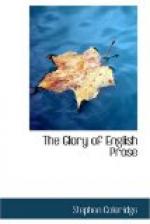This was greatly said. His body was never found; but the rescue party who afterwards discovered the tent with the others dead in it, put up a cairn in the desolate waste of snow with this inscription:—
“Hereabouts died a very gallant gentleman, Captain L.E.G. Gates, Inniskilling Dragoons, who, on their return from the Pole in March, 1912, willingly walked to his death in a blizzard to try and save his comrades beset with hardship.”
All this was done, said, and written, very nobly by all concerned.
In St. Paul’s Cathedral there lies a recumbent effigy of General Gordon, who gave his life for the honour of England at Khartoum, and upon it are engraven these words:—
“He gave his strength
to the weak, his substance to the poor, his
sympathy to the suffering,
his heart to God.”
Even the concentrated terseness of Latin cannot surpass these examples of the power of the simplest and shortest English sentences to penetrate to the heart.
English can be used, by those who master it as an organ of expression, to convey deep emotion under perfect control, than which nothing is more moving, nothing better calculated to refine the mind, nothing more certain to elevate the character.
Whenever a man has something fine to communicate to his fellow-men he has but to use English without affectation, honestly and simply, and he is in possession of the most splendid vehicle of human thought in the world.
All the truly great writers of English speak with simplicity from their hearts, they all evince a spirit of unaffected reverence, they all teach us to look up and not down, and by the nobility of their works which have penetrated into every home where letters are cultivated, they have done an incalculable service in forming and sustaining the high character of our race.
Clever flippant writers may do a trifling service here and there by ridiculing the pompous and deflating the prigs, but there is no permanence in such work, unless—which is seldom the case—it is totally devoid of personal vanity.
Very little such service is rendered when it emanates from a writer who announces himself as equal if not superior to Shakespeare, and embellishes his lucubrations with parodies of the creeds.
“A Gentleman with a Duster,” has in his “Glass of Fashion” shown us that the Society depicted in the books of Colonel Repington and Mrs. Asquith is not the true and great Society that sustains England in its noble station among civilised peoples, and we may be sure that neither do these books in the faintest degree represent the true and living literature of the times. They will pass away and be forgotten as utterly as are the fashion plates and missing-word competitions of ten years ago.
Therefore, Antony, be sure that the famous and living literature of England, that has survived all the shocks of time and changes of modern life, is the best and properest study for a man to fit him for life, to refine his taste, to aggravate his wisdom, and consolidate his character.




